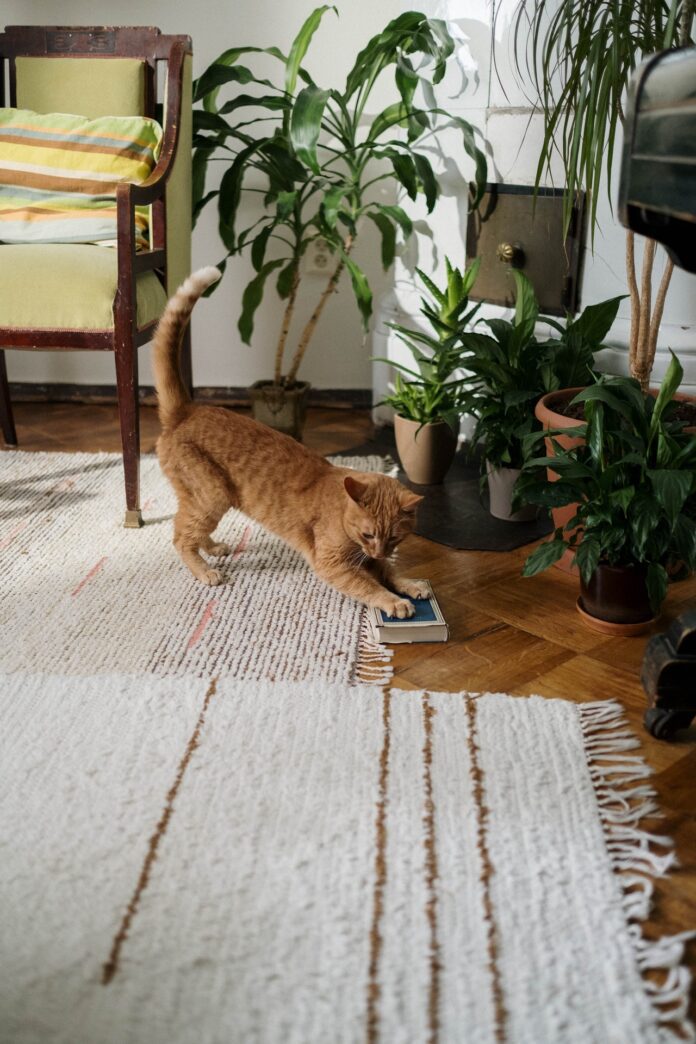Household cleaning demands total £4,146 across a dog’s lifetime and £3,887 across a cat’s lifetime
Next has surveyed UK pet owners to uncover attitudes towards pet-proofing plus they have spoken to experts for tips on how to minimise any pet-related damage in the home
- For 33% of pet owners, it’s necessary to clean the carpet more than once a week due to shedding and 27% admit to hiring a cleaner to help them out
- Belfast takes the top spot when it comes to damage costs, with a staggering £406 but with just 44% of pet owners in Belfast pet-proofing, it’s thought that some of these costs may have been avoided
- Pets can be our best friends but for 67% of pet owners, our pets have accidentally caused damage in our homes at one point or another
- But our furry friends aren’t going anywhere- experts weigh in from both an interior design and an animal psychology viewpoint to give tips on how we can keep both our pets and our household items safe
- 43% didn’t pet proof their home ahead of bringing home their furry friend
Amidst the covid pet boom, as many as 3.2 million people[i] brought a new furry bundle of joy into their lives. But the experience of bringing home a pet comes with a training period and unfortunately there may be some unavoidable damages along the way such as scratches on the sofa and ripped bed sheets.
Though we’ll forever love our pets, Next has found that 43% didn’t pet proof their home by buying things such as stairgates, sofa covers and cable protectors – which could be putting furniture and more importantly our pets at risk.
By conducting a survey of 2,000 UK pet owners, Next has revealed that, on average, dog owners are spending £4,377 and cat owners £4,086 over their lifetimes to cover any accidental pet-related home damage and cleaning costs. Next has also uncovered the most common household items damaged by our lovable pets, and the average amount of money lost if we are to repair or replace these items.
Next spoke to interior design experts and pet behaviourists for tips on how to minimise pet-related damage in the home.
You can view the full piece here: https://www.next.co.uk/edited/homeware/pet-proof-living-room
The UK’s attitudes to pet proofing and cleaning demands
The UK are a nation of pet lovers and so it’s hardly surprising that many choose to share their homes and even their beds with their pets. But amidst the love and excitement, 40% of pet owners didn’t do research before choosing the right breed for them. Likewise, only 29% researched the behaviours of the breed and just 23% researched energy levels and exercise needs ahead of purchase.
Without researching a breed thoroughly, pet owners could be purchasing their pet without knowing their exercise needs or how tolerant they are to being alone. In time, this could mean that their pet may become bored in the home and may be more likely to nibble on their sofa rather than their trusty dog toy.
Some breeds may also shed more than others and so it’s worth also preparing for extra cleaning. At least once a week, 33% of UK pet owners clean their carpet and 30% clean their sofa due to fur, dribble and mess created by their pampered pet.
However, not all pet owners take on this cleaning themselves. 27% of pet owners hire a professional cleaner at least once a month, making the estimated average cleaning cost £237 a year per household. This cost goes towards the maintenance of our furniture plus the removal of stains and fur around the house caused by pets.
For pet lovers, the costs of any small damages to our homes are minimal and owners will gladly pay it for their furry best friends.
Belfast takes the top spot with a staggering £406 (on average) spent to repair or replace home goods due to pet damage. When it comes to pet proofing, just 44% of the city’s residents pet proofed their home (the second lowest of all cities) which helps to explain why such high damage costs are seen in the Northern Irish city.
Second and third on the list of the cities forking out the highest damage costs are Birmingham with £251 and London with £238 per pet. Despite more thorough pet-proofing in both cities, there are still 37% of respondents who admit to not pet-proofing at all in Birmingham and 35% in London.
The cities spending the lowest amounts on damage caused by pets are Sheffield with just £99 of damage per pet, Newcastle with £111 and Cardiff with £136.
| Damage costs per city | |
| City | Average cost of damage (per pet) |
| Belfast | £406 |
| Birmingham | £251 |
| London | £238 |
| Nottingham | £229 |
| Manchester | £228 |
| Leeds | £221 |
| Liverpool | £194 |
| Norwich | £190 |
| Edinburgh | £180 |
| Bristol | £173 |
| Brighton | £161 |
| Southampton | £159 |
| Plymouth | £158 |
| Glasgow | £156 |
| Cardiff | £136 |
| Newcastle | £111 |
| Sheffield | £99 |
The most damaged household items
Sometimes our lovable pets may unknowingly damage our household items beyond repair and so these items need replacing.
Bedding is the most common item in need of replacement according to 27% of respondents. This includes everything from quilt covers and pillows right through to the more expensive quilts and mattresses.
The next items to be replaced are sofas and cushions with 26% of pet owners replacing these at some time due to damage from pets.
Whether or not you should allow your pampered pets into your bed or on your sofa is always up for debate – and with both being the most common items to be replaced, many might want to keep watch when their pets are on their comfy furniture for a snooze.
Other common items pet owners have had to replace include carpets (18%), electricals (16%) and even windows and doors (12%).
Zac Houghton, CEO at Loftera, a company expert in house renovations and interior services, shares tips on how pet owners can pet-proof their house without compromising on style.
- Consider the fabrics when choosing furniture
- “Cat owners should choose velvet, as it doesn’t scratch as much, and scratch marks will show less on it. Synthetics like Ultrasuede are also high-quality fabrics that are easy to clean.”
- “The best choice for dog owners is leather because it doesn’t absorb odours or gather fur. When it comes to colours, they should match the colour of pets.”
- Stick to easy-to-clean paints
- “Pets can damage walls due to their slobber, and rogue paws. A semi-gloss paint finish is easier to clean than other paints in a matte finish”
- Use removable covers where your pets relax
- “If you have a lounge, it’s a good idea to buy a durable blanket that you can put under your pet while they relax on the couch. Also, choose sofas and cushions with slipcovers that you can remove to wash if necessary.”
- Consider easy to clean flooring
- “Choose flooring options that are easy to clean and won’t attract furs, such as tiles, polished concrete, and hardwood.”
- Minimise the treasures your pet can find in the home
- “Try to keep all your storage spaces closed if your pet enjoys exploring a lot. Invest in closed shelving as much as you can as well.”
Dogs vs Cats?
Whether you’re a cat lover or a dog lover, or in fact both, unfortunately you’re still likely to experience damage in the home at one point of another.
The average damage costs for dogs are slightly higher than that of cats, with damage caused by dogs estimated to have cost owners an average of £231 compared to £199 from cats.
When looking across a pet’s average lifespan – 14 years for dogs, 15 years for cats – dogs are costing the UK population on average £4,146 in cleaning fees, whereas cats are costing slightly less at £3,887.
This means that overall, dogs are taking the crown as the more expensive pet when it comes to cleaning and repairing any damage. But as a nation of pet-lovers this should far from stop us from having furry best friends. That’s why we spoke to pet behaviourists for advice on things that we can do as pet owners to keep our pets busy, avoid any damage and increase the safety of our pets in our homes.
Rachel Rodgers, Clinical Animal Behaviourist and the owner of Nose to Trail, provides insights on how to avoid and stop dogs from destroying things around the house:
- Digging- “Rather than having your flower beds dug up, or your cushions shredded into white clouds of fluff – give your dog a boredom box. Get your old delivery boxes and put in some scrunched up pieces of paper or cardboard from the recycling bin and throw in a handful of your dog’s treats for them to find. They can get this digging desire out by shredding up the cardboard that you can then pick up and pop straight in the bin. If they are a keen digger buy a cheap children’s sandpit and hide some toys in there. Encourage them to dig here and make it more rewarding than anywhere else they may choose to dig in your home.”
- Chewing – “Dogs can hold a lot of tension and stress in their jaws, so giving them something to chew on, particularly for teething pups, is vital. Try to match the texture of things they like to chew in the house, so if they are chewing the wood on your chairs and tables then invest in an ancon tree root, or coffee tree root for them to chew instead. These chews are ideal as they don’t splinter and have the same level of risk as a normal stick you find in the garden. If they like to chew soft things like fabric, find suitable dog toys for them to chew and mount instead.”
Nikki French from Pup Talk &Twickenham Dog Services adds that “a dog that is mentally stimulated finds it easier to relax and switch off. It will make them less likely to try and find something to occupy themselves, like chewing your dining chair legs! This doesn’t necessarily mean chasing a tennis ball around the local park – this can have the opposite effect of getting them over-excited.
But helping our dogs learn to be calm more of the time can really help with destructive behaviours. Picture a calm dog curled up snoozing while you prepare dinner. That’s not a dog that feels like chewing the corner of your rug.
You can grow your dog’s ability to be calm more often with some simple brain games you can play at home.”
For more information on pet-proofing your home, from the costs right through to the best methods to pet-proof, visit Next. https://www.next.co.uk/edited/homeware/pet-proof-living-room
Help keep news FREE for our readers
Supporting your local community newspaper/online news outlet is crucial now more than ever. If you believe in independent journalism, then consider making a valuable contribution by making a one-time or monthly donation. We operate in rural areas where providing unbiased news can be challenging. Read More About Supporting The West Wales Chronicle























